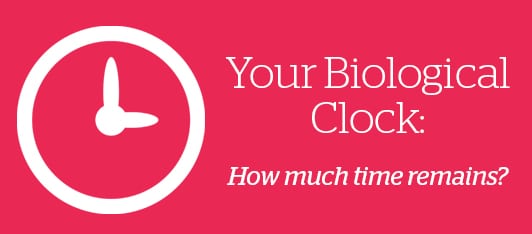
Ladies, did you know that the amount time left on your biological clock is mainly determined by the quantity of high quality eggs in your ovaries, otherwise known as your ovarian reserve? Your ovarian reserve is mainly based on your age.
You are born with the most eggs you will ever have—about 1,000,000 to 2,000,000 immature eggs, or follicles, in your ovaries. As adolescent reaches puberty and starts to menstruate, only about 400,000 follicles remain. With each menstrual cycle only one egg matures and about 1,000 die off. By the time you reach menopause (typically between the ages of 48 and 55), often no follicles remain and, if they do, they are unable to reach maturation due to hormonal changes. Learn More about Egg Freezing
Pausing the Clock
As you may have heard before, egg freezing essentially pauses the biological clock. By freezing eggs at higher quality, when ovarian reserve is strong, you can come back and use them when otherwise your eggs may no longer yield a pregnancy.
For women who want to freeze, it is a balance. On average, the most optimal time to freeze is the early- to mid-30s—when there are enough eggs of high quality. While it is still possible to freeze after the mid-30s, it may take more freeze cycles to retrieve enough mature eggs for future pregnancy.
Over the past few years, as awareness of this option has increased, at Shady Grove Fertility we have observed that increasingly more and younger women are freezing. For example, in 2012, the average age of a woman freezing her eggs at Shady Grove Fertility was 38. Today, the average age is 36, and we are continuing to see a downward trend.
Learn How Much Time You Have: Ovarian Reserve Testing
Ovarian reserve testing is currently available at Shady Grove Fertility to women who are interested in or considering freezing their eggs. Testing your ovarian reserve provides information about how many eggs you have at a point in time as well as examines the quality of eggs. Two tests determine a woman’s ovarian reserve:
- A vaginal ultrasound is the best way to accurately assess and count the number of antral—or resting—follicles in each ovary. These sacs contain immature eggs that may potentially develop in the future. Counting the number of follicles is called an antral follicle count (AFC), which is performed via an ultrasound. This test, along with the female age, are the best tools for estimating ovarian reserve and the expected response to ovarian stimulation and the success of an egg freezing cycle.
- A blood testtaken on day 3 of the menstrual cycle provides a measurement of different hormones including: a woman’s follicle stimulating hormone (FSH), estradiol (E2), luteinizing hormone (LH), and anti-Müllerian hormone (AMH) level. Each of these hormones plays a vital role in the development, growth, and function of a woman’s ovaries, the quality of her existing follicles, and the potential for egg development.
$325=Results and No More Guessing
By testing the ovarian reserve, a woman can more easily identify if egg freezing is right for her. This option is readily available for women living in the Washington DC metro area, Northern Virginia, Maryland and Pennsylvania at one of the 24 Shady Grove Fertility locations. To have your ovarian reserve tested:
- You will need to schedule a 1-hour visit at one of the 24 Shady Grove Fertility locations on day 3 of your menstrual cycle (coordinated with a nurse).
- You will discuss test results with a Shady Grove Fertility physician during a second 1-hour visit.
- Ultrasound and blood test results provide detailed insight into your current ovarian reserve and if egg freezing is a viable option for you.
- Cost: 90% of patients with insurance have full or partial coverage for diagnostic testing and the initial consult. If not, the cost is $325.
Find Your Answers
- Talk with an Egg Freezing Patient Liaison: 1-877-411-9292
- Schedule an appointment
- Learn About the Cost of Freezing Eggs





